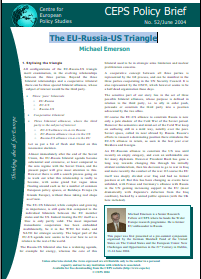№079. The Black Sea as Epicentre of the Aftershocks of the EU’s Earthquake
№079. The Black Sea as Epicentre of the Aftershocks of the EU’s Earthquake
Author(s): Michael Emerson
Subject(s): International relations/trade
Published by: CEPS Centre for European Policy Studies
Keywords: Black Sea ; Danube basin; EU-Constitution; EU-Referendum;
Summary/Abstract: CEPS Senior Research Fellow Michael Emerson asserts that the aftershocks of the EU’s failed referenda on the European Constitution will be most sharply felt – in an external sense – in the Black Sea region. He describes how Bulgaria, Romania, Turkey, Ukraine, Moldova and Georgia were the first hit by the tremors. But he traces its effects further than that, up the Danube basin to Belgrade, across the Caucasus to Armenia and Azerbaijan, and last but certainly not least up to Russia. For all the states that have been espousing long-term EU membership aspirations – including all of the above, except Russia –the author recommends they take time out for a reality check. For Russia, which had not anticipated this upset in the EU, it may be interpreted not so much a time for a rethink, as an encouragement not to have a rethink. For these states (in different degrees), there is a new question of strategic importance and the name of the game has changed. Emerson is keen to explore whether the EU’s hugely successful political conditionality machine and gravitational powers of attraction, as evidenced in its recent enlargement, can continue to operate with some variant model of virtual, functional membership? Or, if not, he asks whether the prospects for the deepening and consolidation of democracy in these regions are going to be seriously prejudiced? Date of Publishing: July 1, 2005
Series: CEPS Policy Briefs
- Page Count: 12
- Publication Year: 2005
- Language: English
- Content File-PDF

